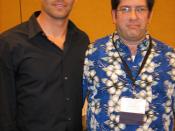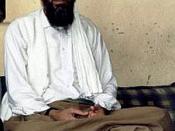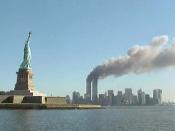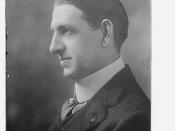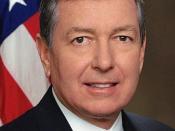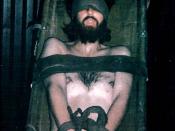Since September 11, 2001, all Americans can think about is getting even with the Taliban and Osama bin Laden. So, when an American young man is found fighting for the Taliban and not for the United States, turmoil erupted and we, as Americans, became the Queen of Hearts from Alice in Wonderland, shouting "Off with his head."ÃÂ But what of this young man-this 20-year-old boy? Was he brainwashed like his father comments or is he just against Americans? Claudia Rosett, author of "Johnnie Walker on the Rocks,"ÃÂ Michael Kinsley, author of "Forgiving John Walker,"ÃÂ and John Cloud author of "U.S. v. Lindh, Round 1"ÃÂ each express their opinion on what should be done about John Walker.
In the article, "Johnnie Walker on the Rocks,"ÃÂ Claudia Rosett argues that John Walker should take responsibility for his actions. His parents are fighting for him and believe that he has not done anything wrong.
Quoted in the article, "Their son John is a spiritual, questioning guy"æa pacifist at heart, young and maybe susceptible to brainwashing."àThey cannot connect the dots of where John was and where John is, but Rosett does not buy that. She comments, "The dots we've seen so far"ÃÂespecially in Newsweek and on CNN"ÃÂinvite some definite connecting."àAccording to the article, thus far, John Walker did not know about the attacks on America before they happened, but he does support them. Rosett declares, "there's a line that has been crossed."àMostly, Rosett holds the parents responsible for what Walker has become. She tells a lot of what happened in Walker's past to be where he is today. Rosett points out that Walker was spoiled as a child and his father sent him money while he was traveling about in Afghanistan. She says, "It's painful to watch. It's tragic. But that doesn't make it all right."àIn my opinion, the strongest argument that Rosett makes is about how Walker's parents believed him mature enough at age 17 to "don turban and robes and take a voyage to Yemen"ÃÂ, but now that he is 20 and has "arrived at the Taliban terminus of his personal journey"ÃÂ, he is suddenly too young to know his own mind. The weakest argument is that Rosett does not go farther with what she thinks about Walker. She says that a line has been crossed and that the readers should connect the dots, but what about what should be done with him? In contrast, the article "Forgiving John Walker,"àwritten by Michael Kinsley, says that John Walker has, of course, made a mistake, but everyone does and he needs a second chance. According to the article, Attorney General John Ashcroft wants to "make an example"àof Walker, but whom to, Kinsley asks. He points out that we do not have a problem with young Americans wanting to join the Taliban. Kinsley also asks, "Is Ashcroft here confirming his reputation as someone who brings more enthusiasm than reflection to the process of trying people and punishing them?"àPresident George W. Bush says, "When I was young and irresponsible, I was young and irresponsible,"àand he says about Walker that, "this poor fellow obviously has been misled."àKinsley says, "Walker obviously has been irresponsible in ways the young George W. never contemplated."àMoreover, as Kinsley points out, Walker played some unknown but small and ineffectual role in defending Afghanistan from an attack by the United States and he does support what happened on September 11, which is, as Kinsley says, "repellent but not a crime."àWalker has not any special treatment, and will probably not face any while on trial. What Kinsley is trying to get across is that though Walker did all this, he still is an American citizen and deserves a chance to tell his story and have someone fight for him. Kinsley ends his article by saying, "The superior benefits of American citizenship are "ÃÂwhy they hate us,' as the President points out, and what we're fighting to protect. Now that the Taliban is defeated, even John Walker has the right of every American to forget about Afghanistan."àIn my opinion, Kinsley's strongest argument is about how it is not proven what John Walker has done wrong except for supporting the attack on September 11, which of course is not illegal, just unpatriotic. In my opinion, I do not think Kinsley has a weak argument. I believe he researched his information and covered everything really well; it is just a matter of getting everyone to feel the way he does.
The third and final article is "U.S. v. Lindh, Round 1,"ÃÂ written by John Cloud. Cloud does not really express his opinion much in this article. His gives both sides of view. Cloud says that most recently at a hearing, Walker is, "This version of the 20-year-old is a U.S. citizen who "ÃÂloves America' as his dad insists, but who got messed up with Tabiban brainwashers and then U.S. soldiers who denied him a lawyer for weeks on end."ÃÂ He mentions that Walker told a FBI agent, in interviews, about his story and how he did not care about the attack on New York and kept fighting for the Taliban until he was forced to surrender. However, now his liberal attorney, James Brosnahan, is saying that Walker did not harm any Americans and he asked for a lawyer more than a week before the interviews and did not get one. Cloud points out that before he talked to the FBI, Walker had an interview with CNN, which was voluntary, he told them much the same story as he had told the FBI. Brosnahan claims that Walker talked to them because he was in bad condition on account of being shot in the leg when he surrendered and that he was on medication for the pain. However, this has not been proven. Cloud does say that Walker has been bathed and visited a barber, and he might lose his fake Middle East accent before taking the stand. In my opinion, I think Cloud's strongest argument is the points he makes about Walker talking freely to anyone, but later his attorney giving reasons that he did not know what he was doing. His weakest argument, in my opinion, would be that he hinted about what he thought of the current situation, as being absurd, but he did not come out and say what he thought.
John Walker did a foolish thing, and if he thinks he is going to get off easy, he is wrong. Even if he did not kill any Americans, he still was fighting for the enemy. Furthermore, no one will be about to forget the fact that he supported the attack on September 11. That is a day that no one will forget for a long, long time.
